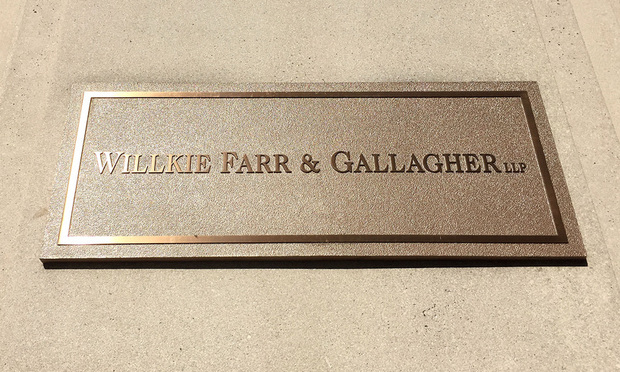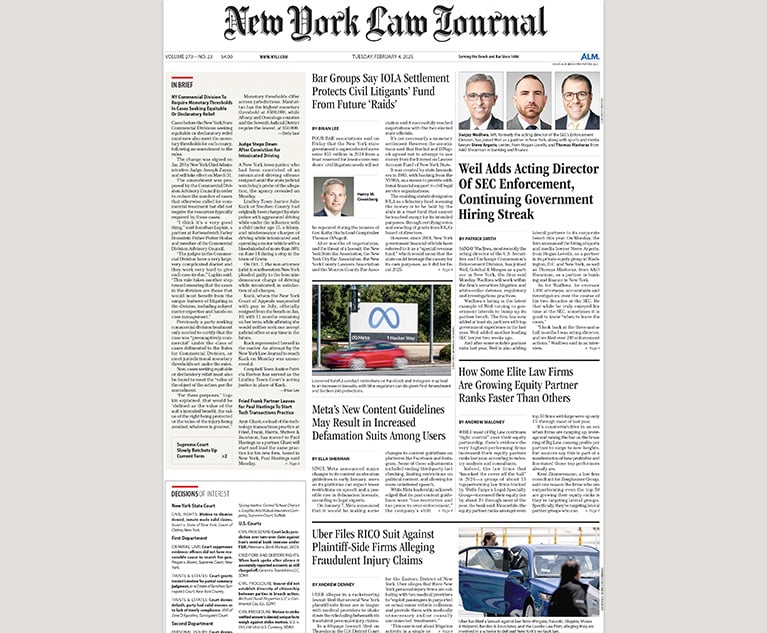Willkie Maintains Silence on College Admissions Scandal
The firm's public response has been limited. But there's every reason to expect that, below the surface, it's been working hard to contain the damage.
March 16, 2019 at 02:44 PM
5 minute read
The original version of this story was published on The American Lawyer
 Wilkie Farr & Gallagher's Washington, D.C., offices. Photo: Diego M. Radzinschi/ALM
Wilkie Farr & Gallagher's Washington, D.C., offices. Photo: Diego M. Radzinschi/ALM
Willkie Farr & Gallagher has now had almost a week to address the fallout from its former co-chairman Gordon Caplan being charged in a nationwide college admissions scandal.
On Tuesday, when news of the scandal broke and Caplan was charged, arrested and released on $500,000 bond, the firm was quiet.
On Wednesday, Willkie issued a statement—on firm letterhead but referencing an outside PR consultant—indicating that Caplan had been placed on a leave of absence from the firm and no longer held any management responsibilities. Since then, the firm has resumed its silence, but one can only assume that the duck metaphor applies: Above the surface, the firm is placidly gliding forward; beneath, it is paddling furiously.
Willkie's public response offers a window into what law firms should and shouldn't do when the unexpected occurs. And the allegations against Caplan and the Hollywood stars, fashion designers, investors and others named in the scandal are nothing if not unexpected.
“There is no way anyone could have guessed that something like this would happen. It's out of left field, which is exactly why there's such public outrage,” said Gina Rubel, a lawyer and marketer who routinely puts together crisis preparation plans for law firms.
While firms plan for natural disasters, cyber breaches and, increasingly, the prospect of seeing lawyers ensnared in #MeToo allegations, anyone predicting a $75,000 payment aimed at fixing a college test score would be offered long odds. Still, it's a fair assumption that a powerhouse firm like Willkie was sitting on a precise crisis plan, one thorough enough to take into account related scenarios, like the more general prospect of a criminal misstep by a top partner.
California-based law firm public relations specialist Elizabeth Lambert says the best crisis plans involve imagining a wide range of contingencies.
“You have to be thorough,” she says. “You have to be creative.”
The plans will indicate who to bring into the room, or get on the phone, as soon as the unexpected strikes. For a reputational crisis, like the one currently facing Willkie—with client relationships, industry and public perceptions, and attorney and staff morale at stake—that means having the firm's general counsel, outside counsel and outside PR in place.
“They need outside, objective counsel that says, 'This is how we should handle this,'” Rubel said.
With that team assembled, the first step is to make sense of what may be a muddled picture.
“It always begins with the facts, making sure you understand what happened, and that you communicate it transparently and truthfully to everyone who matters,” said Joshua Galper, a crisis manager and founder of law firm Davis Goldberg & Galper.
That means immediate communications with Caplan's clients, and being forthright with other lawyers and staff.
“Their first duty is to their clients and employees,” Rubel said.
An internal investigation, probing Caplan's work on behalf of his clients, would likely follow, as would a referral to state bar regulatory authorities, reporting the unethical conduct. The firm has not addressed whether it has taken either step, a point that some outside observers have found jarring.
“They need to make a commitment publicly to finding out what else Mr. Caplan has done at the firm that would lead to some inappropriate conduct or poor judgment,” said Wayne Pollock, managing attorney at PR firm Copo Strategies.
Acknowledgment of such an investigation isn't out of the question, considering recent examples of lawyers being accused of missteps while at their firm. When a Hogan Lovells attorney was spotted watching pornography at his London office in November, the firm both suspended him and announced an investigation. Likewise for Dentons, when it was exposed to allegations that a male partner engaged in inappropriate behavior at a Scottish firm it absorbed in 2017.
The legal questions here may be more complex, from whether the disregard for morality Caplan expressed in recordings extends to his handling of client matters, to whether any of the activities spelled out by the U.S. Department of Justice took place on office computers on work time. All of this speaks to the challenge of balancing obligations to the court of public opinion and the court of law.
With the firm's sole public communication about the issue a lean, five-sentence statement that goes no further than highlighting the “seriousness” of the matter, it's easy to critique what's missing. (It's harder yet to be in the crisis manager's shoes.)
For several onlookers, that's a more forceful condemnation of the scandal itself, a story that's galvanized national attention and prompted widespread scrutiny of the college admissions process.
“The firm, from a reputational perspective, needs to project a message that is consistent with its beliefs and values,” Galper said, noting that clients, associates and staff, as well as others in the wider legal community, want to know that it recognizes that gaming college admissions while keeping one's children in the dark is a lamentable act.
“It's not too much to expect a large institution to have an opinion about something that happens in the news,” he added.
Read More:
Willkie's Caplan May Face Legal Challenges From Regulators and His Own Firm
After Bribery Bust, Willkie Is Latest Firm to Face Vacuum in Leadership
This content has been archived. It is available through our partners, LexisNexis® and Bloomberg Law.
To view this content, please continue to their sites.
Not a Lexis Subscriber?
Subscribe Now
Not a Bloomberg Law Subscriber?
Subscribe Now
NOT FOR REPRINT
© 2025 ALM Global, LLC, All Rights Reserved. Request academic re-use from www.copyright.com. All other uses, submit a request to [email protected]. For more information visit Asset & Logo Licensing.
You Might Like
View All

How Some Elite Law Firms Are Growing Equity Partner Ranks Faster Than Others
4 minute read
Law Firms Expand Scope of Immigration Expertise Amid Blitz of Trump Orders
6 minute readTrending Stories
Who Got The Work
J. Brugh Lower of Gibbons has entered an appearance for industrial equipment supplier Devco Corporation in a pending trademark infringement lawsuit. The suit, accusing the defendant of selling knock-off Graco products, was filed Dec. 18 in New Jersey District Court by Rivkin Radler on behalf of Graco Inc. and Graco Minnesota. The case, assigned to U.S. District Judge Zahid N. Quraishi, is 3:24-cv-11294, Graco Inc. et al v. Devco Corporation.
Who Got The Work
Rebecca Maller-Stein and Kent A. Yalowitz of Arnold & Porter Kaye Scholer have entered their appearances for Hanaco Venture Capital and its executives, Lior Prosor and David Frankel, in a pending securities lawsuit. The action, filed on Dec. 24 in New York Southern District Court by Zell, Aron & Co. on behalf of Goldeneye Advisors, accuses the defendants of negligently and fraudulently managing the plaintiff's $1 million investment. The case, assigned to U.S. District Judge Vernon S. Broderick, is 1:24-cv-09918, Goldeneye Advisors, LLC v. Hanaco Venture Capital, Ltd. et al.
Who Got The Work
Attorneys from A&O Shearman has stepped in as defense counsel for Toronto-Dominion Bank and other defendants in a pending securities class action. The suit, filed Dec. 11 in New York Southern District Court by Bleichmar Fonti & Auld, accuses the defendants of concealing the bank's 'pervasive' deficiencies in regards to its compliance with the Bank Secrecy Act and the quality of its anti-money laundering controls. The case, assigned to U.S. District Judge Arun Subramanian, is 1:24-cv-09445, Gonzalez v. The Toronto-Dominion Bank et al.
Who Got The Work
Crown Castle International, a Pennsylvania company providing shared communications infrastructure, has turned to Luke D. Wolf of Gordon Rees Scully Mansukhani to fend off a pending breach-of-contract lawsuit. The court action, filed Nov. 25 in Michigan Eastern District Court by Hooper Hathaway PC on behalf of The Town Residences LLC, accuses Crown Castle of failing to transfer approximately $30,000 in utility payments from T-Mobile in breach of a roof-top lease and assignment agreement. The case, assigned to U.S. District Judge Susan K. Declercq, is 2:24-cv-13131, The Town Residences LLC v. T-Mobile US, Inc. et al.
Who Got The Work
Wilfred P. Coronato and Daniel M. Schwartz of McCarter & English have stepped in as defense counsel to Electrolux Home Products Inc. in a pending product liability lawsuit. The court action, filed Nov. 26 in New York Eastern District Court by Poulos Lopiccolo PC and Nagel Rice LLP on behalf of David Stern, alleges that the defendant's refrigerators’ drawers and shelving repeatedly break and fall apart within months after purchase. The case, assigned to U.S. District Judge Joan M. Azrack, is 2:24-cv-08204, Stern v. Electrolux Home Products, Inc.
Featured Firms
Law Offices of Gary Martin Hays & Associates, P.C.
(470) 294-1674
Law Offices of Mark E. Salomone
(857) 444-6468
Smith & Hassler
(713) 739-1250







